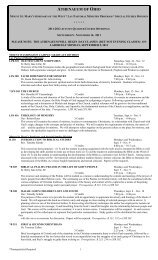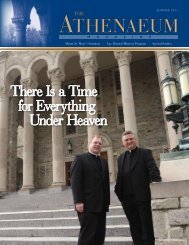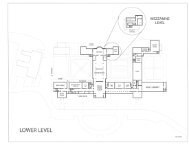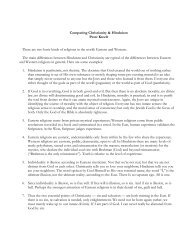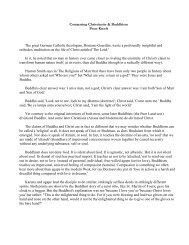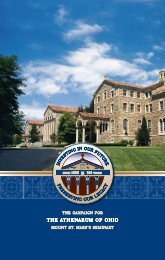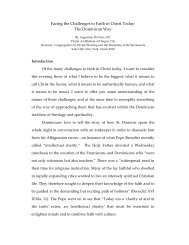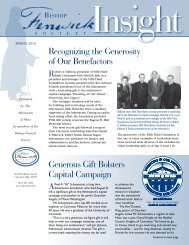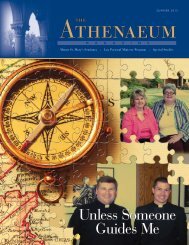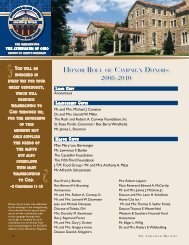Notes from Gathered for the Journey Six (6) essays David McCarthy
Notes from Gathered for the Journey Six (6) essays David McCarthy
Notes from Gathered for the Journey Six (6) essays David McCarthy
You also want an ePaper? Increase the reach of your titles
YUMPU automatically turns print PDFs into web optimized ePapers that Google loves.
Habit—an enduring realityThree characteristics of virtue or habit. :1. A person with a virtue or habit can be relied upon to ―consistently act incon<strong>for</strong>mity with <strong>the</strong> habit.‖ (199)2. A person with a virtue or habit spontaneously acts out of this virtue—―it feels like―a second nature‖ or ―natural‖ to act in con<strong>for</strong>mity with that habit. Nodissonance—a ―no-brainer‖. This term ―second nature‖ may be found in bothAristotle and St. Thomas Aquinas who is deeply influenced by Aristotle‘swritings on ethics.3. A person with virtue or habit is concerned with internal dispositions, particularlyintentions ―In o<strong>the</strong>r words, a habit not only inclines a person to do certain sorts ofacts but also to do <strong>the</strong>m in a certain way, and <strong>for</strong> particular reasons.‖ (200) [i.e.<strong>for</strong> <strong>the</strong> love of God, celebrating love of neighbor or seeing Christ in <strong>the</strong> poorest,abandoned dying person—Mo<strong>the</strong>r Teresa]The term ―virtue‖ applies in general.Mattison wants to make sure we understand that virtuous living can be realizedand expressive of various belief systems.The key is that ―A virtuous person not only consistently and automaticallyper<strong>for</strong>ms good actions, but also does so <strong>for</strong> <strong>the</strong> right reason.‖ (200)Note this ―right reason‖ requires a philosophy of <strong>the</strong> good—and this philosophicalvision can come <strong>from</strong> a secular humanist, Buddhist, Muslim etc. [Instructor’saside: The key is Christian virtues, originating in Christian philosophy of <strong>the</strong>good, grounding discipleship in Christ. (cf. class notes)].A virtue ―is named <strong>for</strong> <strong>the</strong> sort of activity it does well.‖ (200)Two categories of ―doing well‖—(1) <strong>the</strong>ological and (2) moral or ―in <strong>the</strong> world‖Each virtue has a particular ―object‖—its own sort of activity. (200)1. Theological: We can ―do‖ faith, hope and charity ―well‖—<strong>the</strong> <strong>the</strong>ologicalvirtues ―In sum, <strong>the</strong> <strong>the</strong>ological virtues concern God directly (object).They are obtained by grace or infused, and concern our ultimate destinywith God.‖ (201) note <strong>the</strong> need to obtain grace and infusion in andthrough <strong>the</strong> Holy Spirit.2. Moral : Our focus is on <strong>the</strong> virtues that ―concern ‗inner-worldly‘ activitiessuch as eating, drinking, engaging in sexual relations, distributing goods,making practical decisions, and facing difficulties. (201)We call <strong>the</strong>se <strong>the</strong> cardinal virtues—<strong>the</strong> four general areas of virtuous living. Note<strong>the</strong>re are a vast number of virtues—but <strong>the</strong>se are <strong>the</strong> four that act as <strong>the</strong> ―hinge‖(L. cardo ―hinge‖) <strong>for</strong> all <strong>the</strong> o<strong>the</strong>r virtues. They are prudence, justice, <strong>for</strong>titudeand temperance.The ―objects‖ of cardinal virtues are inner-worldly activities—ra<strong>the</strong>r than God asin <strong>the</strong> <strong>the</strong>ological virtues of faith, hope and love.Fundamental Moral Theology Page 48 of 54Class <strong>Notes</strong> – Fa<strong>the</strong>r Michael Seger



